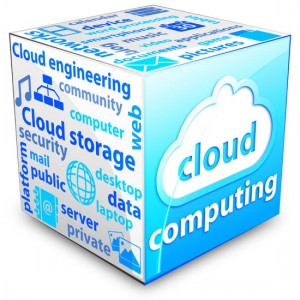Share This
Related Posts
Tags
Moving to the Private Cloud
By Leah Etling on Feb 25, 2012 in Technology | 2 Comments

What’s the next big move for companies wanting to keep their business’ IT infrastructure, applications, and support management in step with the latest trends?
If your business is struggling with servers that are out of date or need to be replaced, or you just want to be more nimble and future-focused while maximizing cost-effectiveness, perhaps you’ve thought about moving your applications and data to a private cloud. The much-discussed clouds are the latest wave of advancement for information technology and best practice business management.
One predictive analysis forecast that the private cloud computing market will grow from $40.7 billion in 2011 to $241 billion in 2020, over several dozen distinct market segments. Other forecasts put that number significantly higher. Cloud services growth is expected to contribute to 14 million new jobs, worldwide, by 2015. Recently initiatives by Microsoft, GoDaddy, expansion by industry pioneers like Amazon, and an influx of venture capitalist funding have fast-tracked the private cloud market for major growth.
“Making the move to the private cloud will be the next big step for forward-thinking businesses who want to maximize their information technology efficiency,” said Scott Wiener, Senior Vice President of Information Technology for Yardi Systems.
The options for cloud users are nearly endless, with service providers offering a wide range of options for network configuration, security, replication and access protocols. As your company prepares to move into the future, consider the following factors:
Is a cloud right for your company:
-Will you be able to achieve your goals of budgeting and cost-savings by going the cloud route?
-Will there be any aspects of how you do your work or conduct your business that would be affected or improved?
-How will current onsite IT personnel be involved in the changeover to the cloud?
-What is the time frame for implementation, transition, and network setup?

Selecting the right cloud provider:
-What are the resources of the cloud provider you’ve selected, including the experience and qualifications of their personnel, types of equipment, and years of involvement in the technology industry?
-What type of initial audit and assessment of your current onsite network will the cloud provider conduct, and what factors will be included in their review?
-How many companies is your cloud provider working with, and can they provide corporate references?
How will the transition to the cloud take place:
-Who will be responsible for system updates, versioning, licensing agreements and patches?
-What will be the level of security controls provided for your cloud and how will they align with your corporate standards?
-Is the provider at the highest level of SLA and offering a proven mature support system?
-How will on-site desktops be maintained?
This long awaited innovation in computing has arrived as a cost and efficiency saver for companies of all sizes, and some major technology companies, including Yardi Systems, are extending their years of best practices and cloud computing experience to meet any client needs, regardless of complexity.
For those unfamiliar with the concept of private clouds, they are an extension of your onsite corporate network. Companies can choose how much of their network they wish to retain on on-site servers, and some are making full transitions to all-cloud networks.
Imagine an office where the only technology you needed to run your company was Internet access. Could you run your company from a tablet computer, or have all your employees on Wyse thin client terminals with minimal infrastructure? It’s possible with the private cloud.
Management protocols
Companies moving to clouds should have the option to manage their private cloud as much or as little as desired. The beauty of the private cloud is that all aspects are customizable. Network management, including hardware, software, and support can be self-managed by the client or completely managed by external experts. Provisions can be made for speed requirements – for example, a company with a need for near-instant access to certain files or data might be provisioned with a server in their environment housing those particular files.
It’s important to find a multi-disciplinary technical team with the expertise to seamlessly set up private clouds. Clients can maintain control overall aspects of security, including firewall configurations.
You should be able to choose the level of data redundancy you’d like to have so that important business information will always be secure. And the cloud provider, ideally, will be able to leverage purchasing power with major companies, procuring the best equipment at the lowest cost, passing that savings on to the client.

Best practice expertise
In the Yardi cloud experience, the company’s technical staff is on call to provide 24-7 support and assistance. Yardi prides itself on rapid deployment and response to your private network requirements, using established best practices for IT management and 25 years of experience.
“We’re already running the most important software that your business requires, so it’s logical to have Yardi host your private cloud as well,” Wiener said, referring to Yardi’s role as an Application Service Provider for 2600 real estate industry clients over the last 12 years, using the Yardi Voyager Web Based Enterprise Management System.
Yardi also offers full disaster recovery with offsite servers, plus the physical security of a carefully protected data center.
Businesses that contract with Yardi for private cloud services are able to offload all their worries about server updates, patching, versioning, redundancy and disaster recovery onto Yardi’s capable shoulders.
Yardi’s servers are the latest, always under warranty, constantly replenished, and fully redundant, Wiener says. “The future is here. It’s more comfortable to come to the cloud.”
For more private cloud info, check out:
Private Cloud Adoption Growth Continues to Accelerate
7 Things Your CEO Should Know About the Cloud
How a Private Cloud Goes Beyond Virtualization Management
Insight: Put Your Cloud Safety Fears Aside
Apple Makes 500K Jobs? Cloud Services Could Help Make 14 Million, With Half in China and India

What percentage can I expect to save off my current IT budget by moving to a cloud service provider?
Hi Karl, This is a complicated question. There are a number of factors that affect cost, like the level of your current IT staff and what your system looks like. We’ll be happy to get you in touch with someone from our IT staff who can discuss your specific system in greater detail. Email us at [email protected] or let us know the best way to reach you.